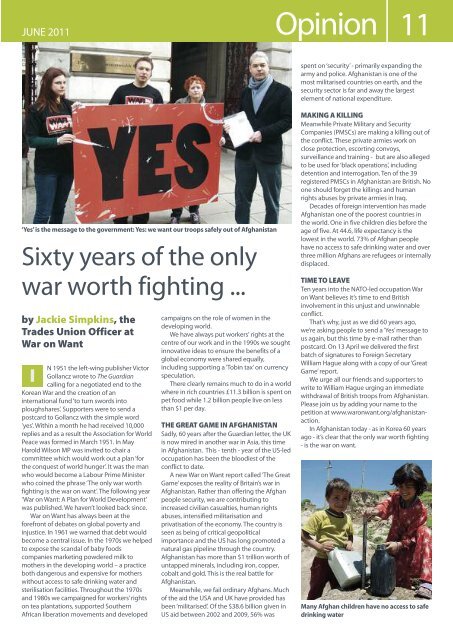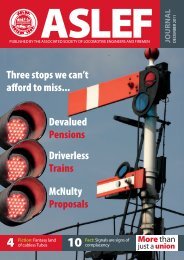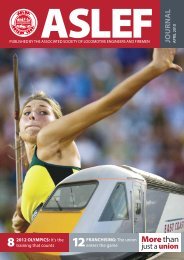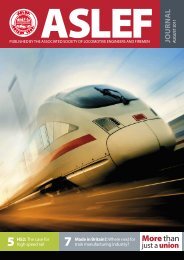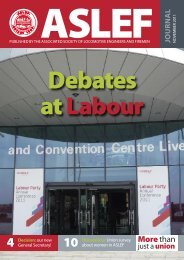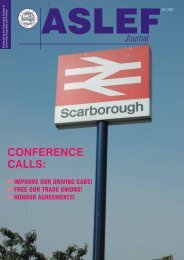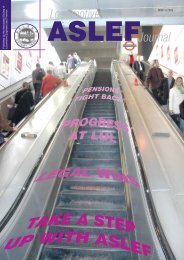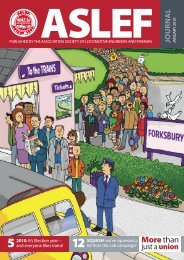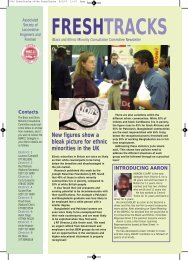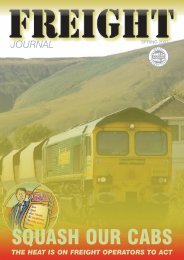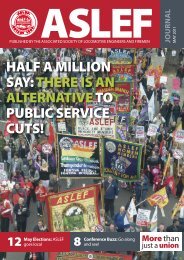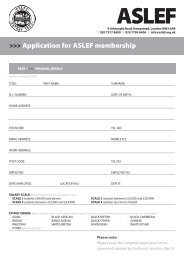You also want an ePaper? Increase the reach of your titles
YUMPU automatically turns print PDFs into web optimized ePapers that Google loves.
opinion 11<br />
JUNE 2011<br />
spent on ‘security’ - primarily expanding the<br />
army and police. Afghanistan is one of the<br />
most militarised countries on earth, and the<br />
security sector is far and away the largest<br />
element of national expenditure.<br />
‘Yes’ is the message to the government: Yes: we want our troops safely out of Afghanistan<br />
sixty years of the only<br />
war worth fighting ...<br />
by Jackie Simpkins, the<br />
Trades Union Officer at<br />
War on Want<br />
I<br />
N 1951 the left-wing publisher victor<br />
gollancz wrote to The Guardian<br />
calling for a negotiated end to the<br />
Korean War and the creation of an<br />
international fund ‘to turn swords into<br />
ploughshares’. supporters were to send a<br />
postcard to gollancz with the simple word<br />
'yes'. Within a month he had received 10,000<br />
replies and as a result the Association for World<br />
Peace was formed in march 1951. in may<br />
harold Wilson mP was invited to chair a<br />
committee which would work out a plan ‘for<br />
the conquest of world hunger’. it was the man<br />
who would become a Labour Prime minister<br />
who coined the phrase ‘the only war worth<br />
fighting is the war on want’. the following year<br />
‘War on Want: A Plan for World development’<br />
was published. We haven’t looked back since.<br />
War on Want has always been at the<br />
forefront of debates on global poverty and<br />
injustice. in 1961 we warned that debt would<br />
become a central issue. in the 1970s we helped<br />
to expose the scandal of baby foods<br />
companies marketing powdered milk to<br />
mothers in the developing world – a practice<br />
both dangerous and expensive for mothers<br />
without access to safe drinking water and<br />
sterilisation facilities. throughout the 1970s<br />
and 1980s we campaigned for workers’ rights<br />
on tea plantations, supported southern<br />
African liberation movements and developed<br />
campaigns on the role of women in the<br />
developing world.<br />
We have always put workers' rights at the<br />
centre of our work and in the 1990s we sought<br />
innovative ideas to ensure the benefits of a<br />
global economy were shared equally,<br />
including supporting a ‘tobin tax’ on currency<br />
speculation.<br />
there clearly remains much to do in a world<br />
where in rich countries £11.3 billion is spent on<br />
pet food while 1.2 billion people live on less<br />
than $1 per day.<br />
THE GREAT GAME IN AFGHANISTAN<br />
sadly, 60 years after the guardian letter, the UK<br />
is now mired in another war in Asia, this time<br />
in Afghanistan. this - tenth - year of the Us-led<br />
occupation has been the bloodiest of the<br />
conflict to date.<br />
A new War on Want report called ‘the great<br />
game’ exposes the reality of britain’s war in<br />
Afghanistan. rather than offering the Afghan<br />
people security, we are contributing to<br />
increased civilian casualties, human rights<br />
abuses, intensified militarisation and<br />
privatisation of the economy. the country is<br />
seen as being of critical geopolitical<br />
importance and the Us has long promoted a<br />
natural gas pipeline through the country.<br />
Afghanistan has more than $1 trillion worth of<br />
untapped minerals, including iron, copper,<br />
cobalt and gold. this is the real battle for<br />
Afghanistan.<br />
meanwhile, we fail ordinary Afghans. much<br />
of the aid the UsA and UK have provided has<br />
been ‘militarised’. of the $38.6 billion given in<br />
Us aid between 2002 and 2009, 56% was<br />
MAKING A KILLING<br />
meanwhile Private military and security<br />
companies (Pmscs) are making a killing out of<br />
the conflict. these private armies work on<br />
close protection, escorting convoys,<br />
surveillance and training - but are also alleged<br />
to be used for ‘black operations’, including<br />
detention and interrogation. ten of the 39<br />
registered Pmscs in Afghanistan are british. No<br />
one should forget the killings and human<br />
rights abuses by private armies in iraq.<br />
decades of foreign intervention has made<br />
Afghanistan one of the poorest countries in<br />
the world. one in five children dies before the<br />
age of five. At 44.6, life expectancy is the<br />
lowest in the world. 73% of Afghan people<br />
have no access to safe drinking water and over<br />
three million Afghans are refugees or internally<br />
displaced.<br />
TIME TO LEAVE<br />
ten years into the NAto-led occupation War<br />
on Want believes it’s time to end british<br />
involvement in this unjust and unwinnable<br />
conflict.<br />
that’s why, just as we did 60 years ago,<br />
we’re asking people to send a ‘yes’ message to<br />
us again, but this time by e-mail rather than<br />
postcard. on 13 April we delivered the first<br />
batch of signatures to foreign secretary<br />
William hague along with a copy of our ‘great<br />
game’ report.<br />
We urge all our friends and supporters to<br />
write to William hague urging an immediate<br />
withdrawal of british troops from Afghanistan.<br />
Please join us by adding your name to the<br />
petition at www.waronwant.org/afghanistanaction.<br />
in Afghanistan today - as in Korea 60 years<br />
ago - it’s clear that the only war worth fighting<br />
- is the war on want.<br />
Many Afghan children have no access to safe<br />
drinking water


